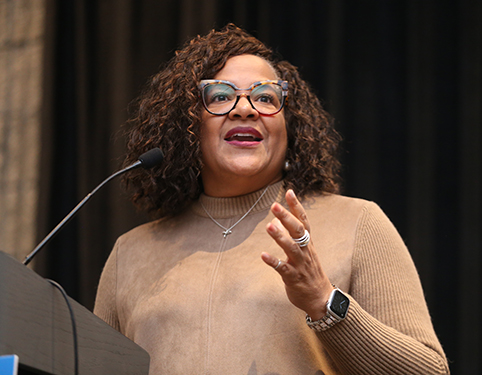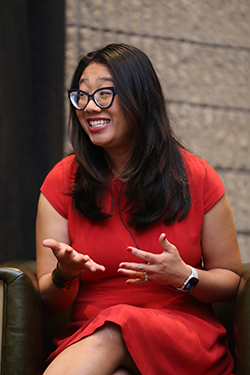Renée Branch Canady once had a male nurse colleague she constantly butted heads with. No matter how she tried, the two just didn’t get along. He also happened to be a yeller — she would often tell him, “let’s lower our voices.”
One day as he began yelling at her, Canady thought of Michelle Obama’s advice: “When they go low, we go high.” So, what happened next? “Well, he went low — and I followed him right into it,” Canady explained to the knowing laughter of women at the “APHA Women’s Leadership Institute: Finding Your Impact and Influence” on Saturday during the APHA 2023 Annual Meeting and Expo.
More than 50 women attended the inaugural Leadership Institute. Canady, CEO of the Michigan Public Health Institute, presented the keynote “Cultivating Your Leadership Persona without Apology.” The yelling match with her colleague — which Canady also outlines in her book “Room at the Table: A Leader’s Guide to Advancing Health Equity and Inclusion” — was an example of “destructive outrage,” she said. It didn’t help the relationship or the work they were doing.
 Instead, Canady calls for “productive outrage,” in which you address, not submit to, the “foolishness” constructively.
Instead, Canady calls for “productive outrage,” in which you address, not submit to, the “foolishness” constructively.
“When fueled by rage, you can still make a positive change,” she said.
Canady defined “productive outrage” as a sense of indignation that drives action and sustained change. “There are many, many, many things as women leaders, as equity leaders, that are going to push you to outrage.…But you have to be the one to be productive in the face of outrage.”
Jewel Mullen told attendees that some of the biggest risks she’s taken in her career and as a leader were when she’s told people what she believes and sees, not simply what they want to hear.
“Part of my leadership is that I exist. And I do things on behalf of others,” she said during a panel discussion following Canady’s keynote address. Mullen is associate dean for health equity and associate professor of population health and internal medicine at the University of Texas at Austin, Dell Medical School.
Leaders don’t have to be charismatic, loud or assertive, despite that male-gendered style of leadership we are taught in the U.S. Canady cited J.L. Chen’s work on visible and invisible leadership. Chen pointed to her own Asian heritage when explaining that choosing not to speak in a particular moment can be a sign of leadership. Another aspect comes from Native American tradition: pushing others quietly from behind.
Women are taught to be demure in American society, but Canady encouraged attendees to stop pretending, to stop refusing to let their full selves be in the room. She pointed to a quote from Shakespeare’s “Hamlet”: “This above all: to thine own self be true. And it must follow, as the night the day, thou canst not then be false to any man.”
Fighting imposter syndrome and fear
Despite being the current APHA president, Chris Chanyasulkit admitted she still suffers from imposter syndrome. But she is learning to lean into her fear. As a first-generation Asian American, she was “supposed to be” a medical doctor, according to her parents.
“My whole life was growing up to be hopeful to be that daughter, to be that doctor daughter. It stays with me,” she said.
Her leadership journey has included learning to be kinder with herself. She realized that she sometimes treated and talked to herself horribly — in a way she would never treat her friends. She leaned into her fear when she ran for APHA president. She thought for sure she was losing the election and was preparing herself for that loss. So, she was stunned when she was told she had won.
In 2009, Chanyasulkit ran for another election: for “town meeting member,” which is one of about 245 elected members that make up the legislative body that governs her town of Brookline, Massachusetts. Brookline is the largest municipality in the state to be considered a town (not a city), with 63,000 residents.
In the majority white town, Chanyasulkit was running as an Asian American who looked younger than she was and had moved in recently. People said, “She isn’t one of us.” And despite her being married and in the midst of earning her PhD, people said Chanyasulkit was running “as a school project.”
But Chanyasulkit persisted: “I have a voice, and I know what I want the future of my town to be.” And she won that election, too.
Chanyasulkit told attendees she shared the story to illustrate how important it is for women — including leaders who have imposter syndrome or have to force themselves to lean into the fear — to run for local, state and national office.
In a passionate speech that was met with loud applause, Chanyasulkit closed out the panel discussion: “I want women and folks everywhere to run. I want you to ask other women to run. I want you to run at your local, state and national level. I say local because local elections matter….We know that public health is happening at the local level.”
Furthermore, she said, “We’ve seen that someone who wins for their school committee, the next time they’re running for Congress, and the next time they’re determining whether or not we’ll have reproductive rights at the national level or paying our student debt. So, I’m asking you all to run, to support other women who run and to know that you can’t win if you don’t run.”
Photos: Renée Branch Canady and Chris Chanyasulkit. Photos courtesy EZ Event Photography.